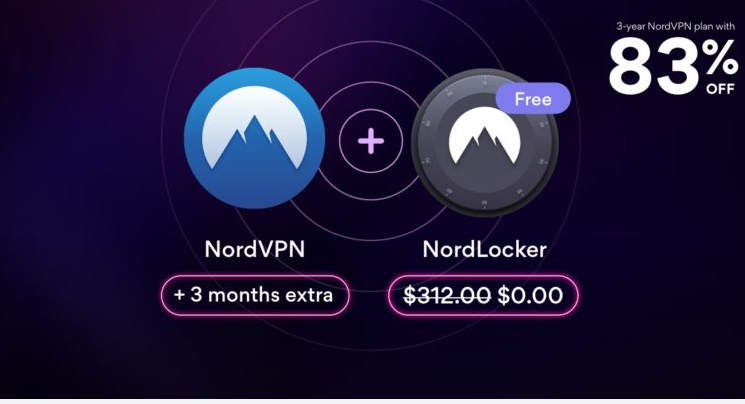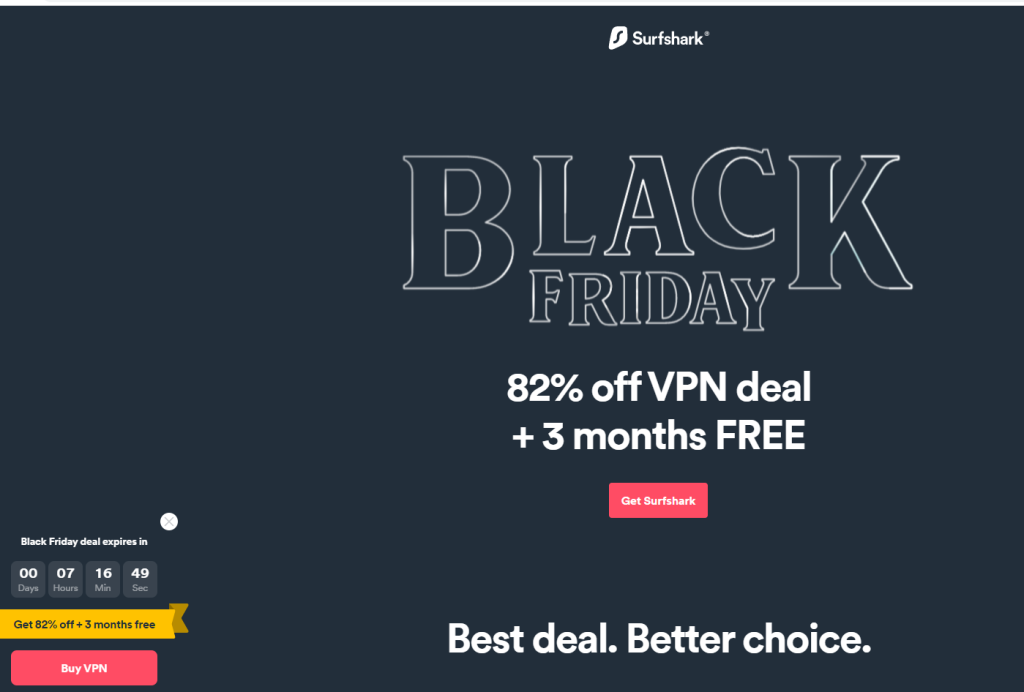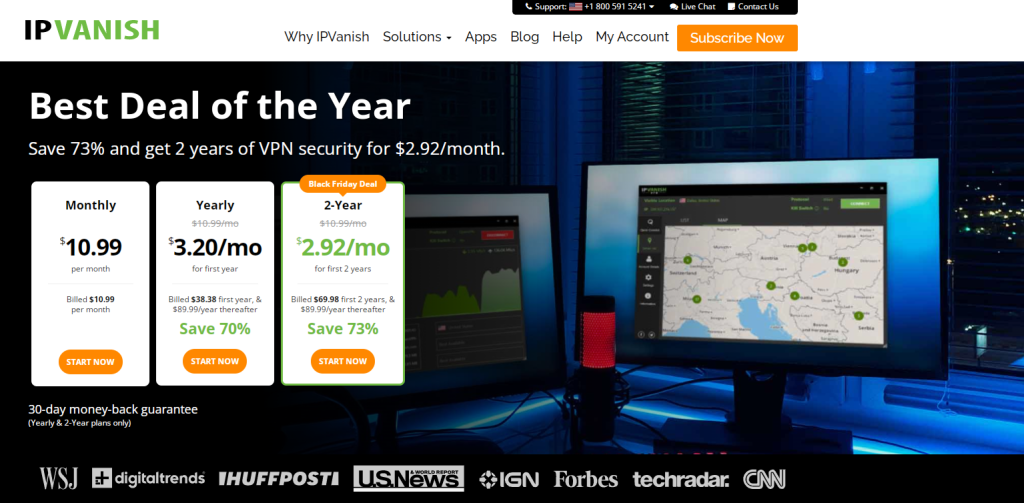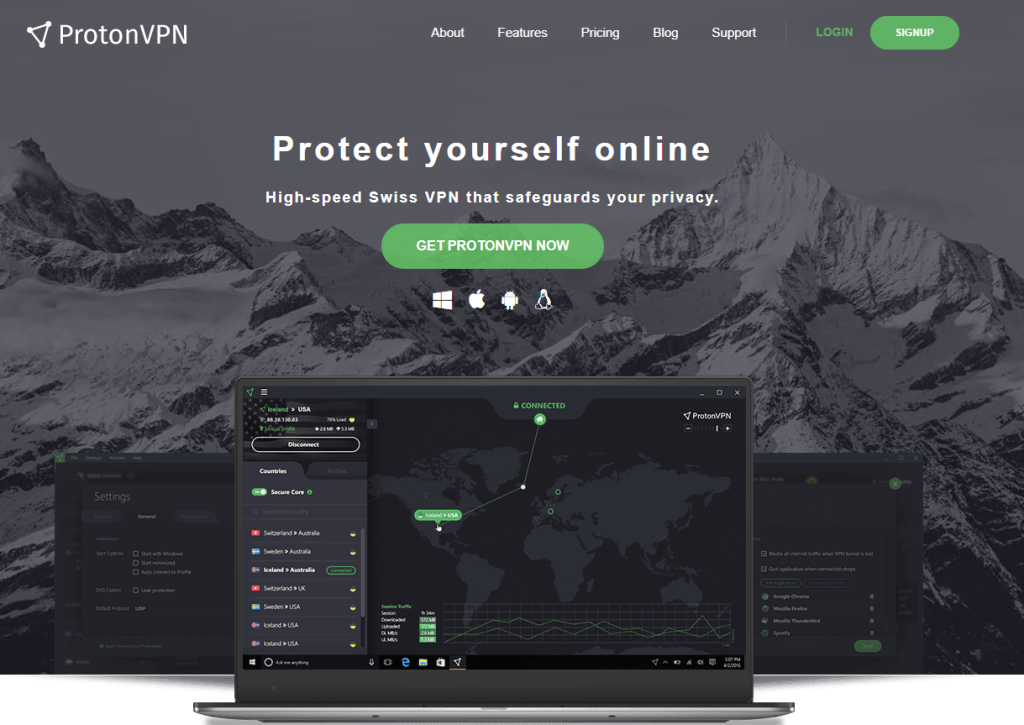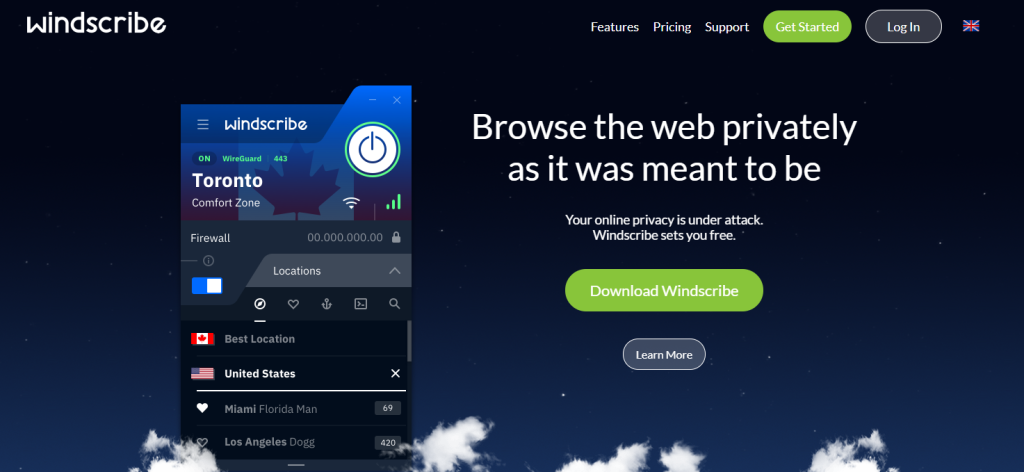What is a VPN
A VPN, or Virtual Private Network, is essentially a tool that encrypts your connection to the Internet and allows you to browse in complete private mode. When browsing through a VPN, you can spoof your location and make it appear anywhere in the world, while also hiding the browsing activity from those who could possibly see it, such as the Internet Service Provider (ISP). In simple words, a VPN connects your device (whether it’s a PC, mobile device or tablet) to a server somewhere in the world, which makes it seem like you’re browsing from the place where the server is located. So, for example, if you’re in the US but connect to a server in Belgium, your location will appear in Belgium. This allows you to bypass geographical restrictions, access a streaming service’s library that’s normally not available to you because of your location, etc. 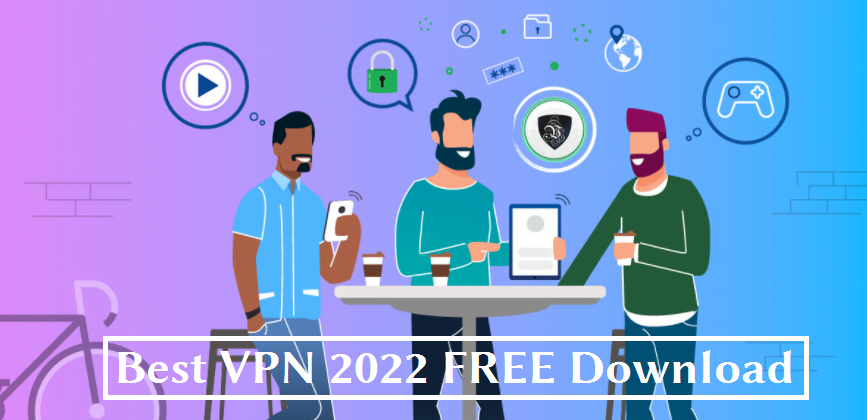
However, using a VPN also ensures that you are browsing more securely and privately, especially when using free WiFi. Since you would be browsing via the server you’re connected to, your ISP would not be able to see your online activities. We should mention that ISPs in most countries with privacy laws do not actively monitor users’ online activities, but there are plenty of countries that disregard any kind of privacy and try to spy on citizens to see whether they are engaging in something that potentially violates the law in those countries. Because VPNs both hide the location and online activity, VPNs are essential tools for many activists, government opposition parties, etc. But that doesn’t mean regular users have no need for a VPN. All of us can benefit from using a VPN as it provides a secure connection to the Internet and ensures that no malicious parties are able to spy to potentially steal information, login credentials, etc.
Reasons to use a VPN
You may be wondering what can you use a VPN for. In truth, VPNs can be used for a variety of purposes. Users can use it for something as simple as accessing Netflix’s US library from another country or for something as serious as protecting oneself when involved in protests against a government.
Here are some things you can use a VPN for:
To access geo-blocked content.
Many countries have strict censorship laws that prevent users from accessing certain services, such as social media and video streaming platforms. VPNs can help bypass these restrictions by setting the location to a different country. Though it should be mentioned that using VPNs is illegal in certain countries, so users should always check.
To make the connection safer, especially when using public WiFi.
Because VPNs encrypt the connection, they make using the Internet much safer and more private, as no one will be able to see any of the browsing activities. VPNs are especially necessary when using public WiFi, as anyone with a bit of skill could intercept the unsecure connection and spy on the browsing activity. This is why users are discouraged from logging into their accounts when on public WiFi.
To hide the IP address and browsing activity.
Users, for whatever reason, may want to completely conceal their presence and hide their browsing activity, and VPNs are great for that. If they are using a reliable VPN, users’ browsing activity would not be visible to anyone, not even the internet service provider. Furthermore, no logs of the activity would be kept. This makes VPNs essential tools for human rights activists and government critics who are located in countries that have strict laws prohibiting people from criticizing the government and other people in power.
To torrent (not encouraged).
While we are not endorsing pirating, users who do pirate usually use a VPN to hide their IP address and activity from Internet service providers and possibly, law enforcement. Downloading copyrighted content for free is illegal in most places, so to avoid getting into trouble, users use VPNs.
To unlock streaming services.
It’s not secret that users in different countries using the same streaming platform may have access to different content. For example, a US user’s Netflix account would have a much broader library than a user’s in Belgium. This is mainly because of copyright laws. One of the more common VPN uses is bypassing these restrictions and accessing content that’s not available in certain countries. For example, a user in Belgium can make their location appear in the US, thus giving them access to the US Netflix library. However, streaming services have started detecting when users use VPNs, so not all VPNs work for this. The streaming services themselves care very little about whether users use a VPN since they still get the same amount of money, but they are pressured by content providers to prevent users from using such programs. Some streaming services like Disney+, HBO and Hulu are not available for the majority of the world, so VPNs are also used to access their content.
Can you use a free VPN?
Technically – yes, is it recommended – not really. Or, it really depends on what the VPN would be used for and whether users care about their privacy.
If you were to google keywords like “Free VPN download 2021”, “VPN free online 2021”, “Best VPN free 2021”, or “VPN free download 2021”, there would be countless results with lists of free VPNs, and while it’s tempting to use a free one, it’s not so simple. Free VPNs are a debatable topic, with many users agreeing that free VPNs are too good to be true.
Free VPNs are problematic for a couple of reasons, mainly because while users do not need to pay for them in money, they pay in their data. The whole idea of a VPN is to protect users’ privacy, and many free VPNs actually track users’ activities and then sell it to third-parties, which is the opposite of what it should do. Some free VPNs admit to this in their Privacy Policies, while others purposely hide this. Furthermore, free VPNs often don’t work to unlock streaming services like Netflix as they are detected.
So instead of using completely free VPNs, it’s better to use a premium VPN that offers free data, though they too are not always useful for unlocking streaming services. And if users choose to use free VPNs, they should always read the Privacy Policy. Or better yet, whether it’s a premium VPN or a free one, users should always read the fine print.
What are the best VPNs to use in 2021 and how to choose one
There are plenty of great VPNs available, and that is primarily why choosing one can be so difficult. To help pick the one that best suits your needs, we have prepared a quick guide on what to look for when choosing a VPN, as well as 7 short reviews on the best VPNs.
Here are the things you need to keep in mind when choosing a VPN:
- Does it keep logs.
Since they are supposed to keep you anonymous, a premium VPN keeping logs of your activities is not acceptable. Unless you have chosen a very questionable VPN, the Privacy Policy should clearly state whether a VPN collects any kind of data. While reading the entire document may seem tedious, it’s highly recommended to do so.
- Does it offer a free trial.
Testing out a program is very important to see whether you like the interface, how well you can use it, does it have what you need, etc. Most VPNs offer free trials, and even a 30-day money-back guarantee, so you should be able to test them out before committing.
- How many devices can be connected.
You’re probably not looking to use a VPN on only one device, so it is important to check how many devices you can connect. Some offer unlimited devices, while others may offer different numbers of devices depending on the subscription plan.
- Does it work with streaming services.
If you’re planning on using a VPN with a streaming service like Netflix or Hulu, you should keep in mind that many VPNs are detected and thus, cannot be used to unlock content. Free VPNs, with possibly a few exceptions, will not work at all. Whether certain VPNs are detected by streaming services changes all the time, so it’s recommended to check recent forum posts to see what users are saying to be completely sure.
- The cost.
While the prices for the majority of premium VPN are more or less similar, some offer more flexible plans. In many cases, it’s also cheaper to buy annual subscriptions than it is to pay on a monthly basis. While you would need to pay a high price all at once, it would be cheaper in the end.
ExpressVPN
- Number of IP addresses: 30,000.
- Number of servers: 3000+.
- Supported OS: Mac, Windows, Linux, Android, iOS.
- Free trial: 30 days.
- Maximum number of supported devices: 5.
- Price range: $9.99/month – $12.95/month.
- 24/7 support: Yes.
- Download free expressvpn
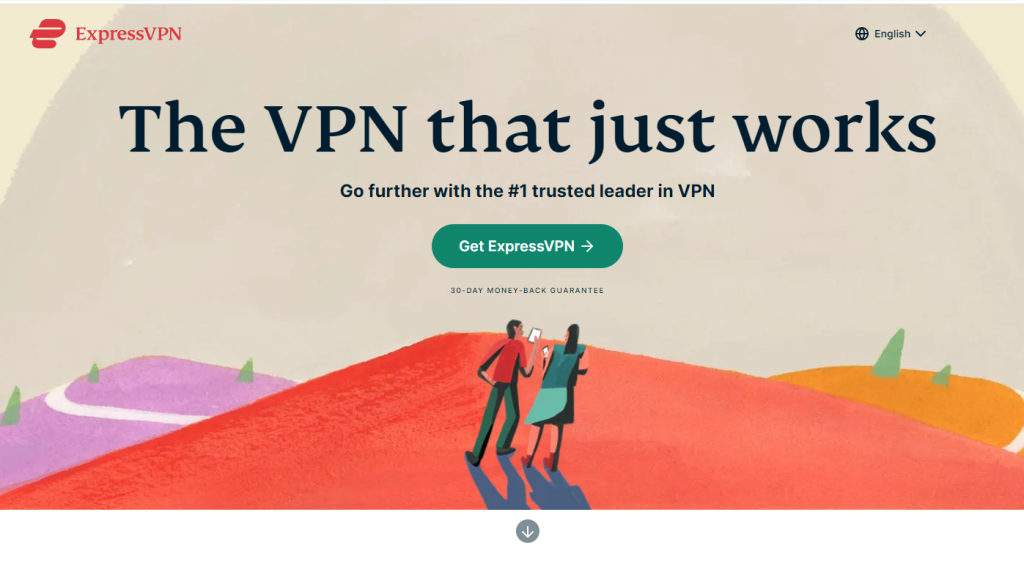 Available on Windows, macOS, iOS, Android, Linux, Mozilla Firefox and Google Chrome, ExpressVPN is one of the most popular VPNs out there. And not without reason. ExpressVPN has a great user-friendly interface, provides quality setup guides and extensive answers to frequently asked questions. ExpressVPN is also one of the fastest VPNs out there, and has over 3000 servers at 160 locations all over the world. The VPN uses custom-built TrustedServer technology to ensure that no logs of users’ online activities are kept, ensuring complete privacy when browsing. This is backed up by an incident in 2017 when Turkish authorities seized an ExpressVPN server and were unable to find any logs that would aid their investigation of the assassination of Andrei Karlov, Russian ambassador to Turkey.
Available on Windows, macOS, iOS, Android, Linux, Mozilla Firefox and Google Chrome, ExpressVPN is one of the most popular VPNs out there. And not without reason. ExpressVPN has a great user-friendly interface, provides quality setup guides and extensive answers to frequently asked questions. ExpressVPN is also one of the fastest VPNs out there, and has over 3000 servers at 160 locations all over the world. The VPN uses custom-built TrustedServer technology to ensure that no logs of users’ online activities are kept, ensuring complete privacy when browsing. This is backed up by an incident in 2017 when Turkish authorities seized an ExpressVPN server and were unable to find any logs that would aid their investigation of the assassination of Andrei Karlov, Russian ambassador to Turkey.
At the time of writing, ExpressVPN does work with streaming services, including Netflix, BBC iPlayer, Hulu, Disney+, HBO Now, and Amazon Prime Video. But this may change at any time, so users should always check recent user reports. It also works to bypass heavy censorship so users in countries like China should be able to access the Internet as it is for the majority of the world.
All of ExpressVPN’s greatness comes with a price, and a relatively high one at that, so it may not be the best option for those looking for a cheap option. It does have a free 30-day trial, so if users are not satisfied with their purchase, they will get their money back. ExpressVPN’s subscription prices depend on the subscription length. If users are willing to pay the lump sum of $99.95 per year, it would be cheaper than paying $12.95 every month. As an in-between option, users can pay $59.95 every six months, which is still cheaper than paying every month. Whichever plan users choose, it comes with a 30-day money-back guarantee. It should also be mentioned that there are some great deals from time to time that would lower the price significantly.
Pros:
- great user interface;
- one of the fastest VPNs out there;
- free 30-day trial;
- 24/7 customer support;
- works to unlock Netflix and other streaming services.
Cons:
- more pricey compared to other VPNs.
NordVPN
- Number of IP addresses: 5000.
- Number of servers: 5400+.
- Supported OS: Windows, Mac, Linux, Android, iOS.
- Free trial: 30 days.
- Maximum number of supported devices: 6.
- Price range: $3.71/month – 11.95/month.
- 24/7 support: Yes.
- Download Free NordVPN
NordVPN is yet another great VPN, on par with ExpressVPN on many best VPN lists. Available on all popular platforms, including Windows, macOS, Android, iOS, and Linux, as well as Google Chrome and Mozilla Firefox, NordVPN is one of the most widely-used VPNs. It’s one of the fastest VPNs in the business, and has over 5400 servers in 80 locations all around the world. NordVPN, as VPNs should, does not keep logs of any online activity, so users can be sure that they remain anonymous when browsing. It has suffered a breach in the past and has received a lot of criticism over not disclosing the breach immediately after becoming aware of it. However, no user information was breached, which just goes to show that NordVPN does not indeed log users’ online activities.
Like Express VPN, NordVPN does currently work with streaming services like Netflix, Hulu, Disney+, BBC iPlayer, and Amazon Prime Video. But this may change at any time, so users should always check recent user reports. It should also be able to work in countries with heavy censorship, such as China.
NordVPN offers a 30-day money-back guarantee which works like a free trial. If users are not satisfied with the program, they can get the amount they paid for in full. If users are willing to commit long-term and pay a lump sum, it’s advisable to get either the two-year plan or the one-year one. The two-year one subscription plan is $3.71/month but users would need to pay the whole $89 sum in advance. The one-year subscription is $4.92/month but again, paying $59 would be necessary. If users want to pay on a monthly basis, there is a one-month plan for $11.95. And as is the case with most VPNs, users can find some great deals that would lower the price significantly.
Pros:
- free 30-day trial;
- fast;
- large number of servers;
- 24/7 customer support;
- works to unlock Netflix and other streaming services.
Cons:
- past data breach.
Surfshark
- Number of servers: 1700+.
- Supported OS: Windows, Mac, Linux, Android, iOS.
- Free trial: 30 days.
- Maximum number of supported devices: Unlimited.
- Price range: $2.49/month – $12.95/month.
- 24/7 support: Yes.
- Download Free Surfshark
Surfshark is another great addition to the list of best VPNs. Available on Windows, macOS, Linux , iOS, Android, as well as Google Chrome and Mozilla Firefox, Surfshark allows unlimited devices and great speeds. Surfshark does not give in to its competitors and can boast amazing speeds. With over 1700 servers in 61 countries, Surfshark is a great choice. It comes with an adblocker and malware blocker as well. It has a strict no-logs policy, which means it does not collect or store any user data. It has some great additional features, such as Camouflage mode, which hides the fact that users are using a VPN even from the ISP.
Surfshark does work with Netflix, Hulu, BBC iPlayer, and other streaming services. But that is the current situation, which may change in the future, so users should always check recent user posts. And while possible, it’s harder to bypass strict censorship, such as when located in China.
Surfshark also has a 30-day money-back guarantee, which works as a free trial. If users are unhappy with the services, they can get the full amount back. Users can choose from three plans, and again, committing long-term is cheaper in the end. Currently, purchasing a one-year subscription plan gives 27 months of usage. The price for the one-year plan is $2.21/month but users would need to pay a $59.76 lump sum. A six-month subscription is currently $38.94/6 months, which is $6.49 per month. If users want to pay on a monthly basis, the price is $12.95/month.
Pros:
- free 30-day trial;
- user-friendly interface;
- 24/7 customer support;
- works to unlock Netflix and other streaming services;
- unlimited devices.
Cons:
- expensive monthly plan.
IPVanish
- Number of IP addresses: 40,000.
- Number of servers: 1500.
- Supported OS: Windows, macOS, Linux, iOS, Android.
- Free trial: No.
- Maximum number of supported devices: Unlimited.
- Price range: $3.25/month – $11.99/month.
- 24/7 support: Yes.
- Download FREE IpVanish
With 1500 servers in 75 locations in more than 50 countries, IPVanish is a user-friendly and fast VPN. IPVanish used to limited the number of devices to 10 but it has recently removed the limit, so users can use it on as many devices as they want. It work on all major platforms, including Windows, macOS, Linux, iOS and Android. It does not keep any logs so users are always anonymous when using IPVanish. While it does slow down the connection to some extent, it’s not particularly noticeable, nor does it affect regular browsing.
It’s worth mentioning that IPVanish was involved in a logging controversy a couple of years ago when it was revealed that the company handed over a user’s personal information to the US Department of Homeland Security in 2016. Among the disclosed personal information was name, email address, IP address, and details of the VPN subscription, meaning that IPVanish did indeed log user information while claiming to not do that. The company was acquired by StackPath in 2017, and the CEO said that no logs existed when IPVanish was acquired.
IPVanish has a 30-day money-back guarantee, meaning no matter which subscription plan users choose, they would be able to get their money back if not satisfied with the services. IPVanish offers three subscription plans with some great prices. At this current moment, there is a 59% discount for the one-month subscription, so instead of the regular $11.99 users would pay $5 for the first month, then $11.99/month. If users want to commit long-term, they can purchase the three-month subscription for $13.50 ($4.50) for the first three months, and then pay $35.97 every three months. A one-year subscription is $39 ($3.35/month) the first year, then $143.88/year after that. Subscribing long-term is only worth it for the first 3 months or the first year, as after that the price goes up to $11.99/month with users needing to pay the lump sum in advance.
Pros:
- unlimited devices;
- good speed;
- 24/7 customer support;
- user-friendly interface.
Cons:
- past data logging controversy;
- doesn’t appear to work with streaming services at this time.
ProtonVPN
- Number of servers: 1000+.
- Supported OS: Windows, Mac, Linux, iOS, Android.
- Free trial: 7 days.
- Maximum number of supported devices: 1-10.
- Price range: $0/month – $24/month.
- 24/7 support: No.
- Download FREE ProtonVPN
Available for Windows, macOS, Linux, iOS, and Android, ProtonVPN is a powerful VPN with a free unlimited bandwidth version that is sure to attract many users. While ProtonVPN may not be completely on par with VPNs like Express VPN and NordVPN, it’s still a great option that comes with some appealing features, such as the ability to route traffic through multiple servers or the Tor network. It has over 1000 servers in 50 locations, and allows up to 10 simultaneous connections, depending on the subscription plan. It uses high-quality encryption, keeps no logs (even when using the free version), and offers subscription plans with different features, depending on what users need. Though it lacks 24/7 customer support, and only the most expensive plans allow to unlock streaming services, it’s still a good choice of a VPN.
ProtonVPN does unlock streaming services like Netflix, Amazon Prime Video, BBC iPlayer, etc., as well as sites like YouTube, Wikipedia, etc., but only if users subscribe to either the Plus or the Visionary, which while not the cheapest ProtonVPN plans, are still cheaper than what other VPNs offer.
Unlike many VPNs, ProtonVPN has a free version with unlimited bandwidth. The free versions allows only one connection and access to servers in only 3 countries but no logs are kept. But while users shouldn’t expect the free version to be particularly fast, even though it says “Medium speed”, it’s still a great alternative to free VPNs. If users want access to more features, they will need to switch to a paid plan. There are three options to choose from, the Basic plan, Plus, and Visionary. Users can choose either to pay on a monthly basis, for the whole year, or for two years. Because of the discounts, in the end it’s cheaper to subscribe long-term for the year or two years.
Basic – $5/month ($48/year, $79/two years) allows 2 VPN connections, gives access to servers in 50 countries, keeps no logs, shows no ads, has high speed, and offers P2P/BitTorrent support.
Plus – $10/month ($96/year, $159/two years) allows up to 5 VPN connections, all Basic plan features, as well as Secure Core VPN (passes traffic through multiple servers), Tor over VPN (a feature to route the Internet traffic through the TOR network), and access to blocked content (streaming services like Netflix, Amazon Prime, etc.).
Visionary – $30/month ($288/year, $479/two years) allows up to 10 VPN connections, gives access to all above mentioned features, as well as all paid ProtonMail features.
Pros:
- free version with unlimited bandwidth and no logs/ads;
- user-friendly interface;
- cheaper than many other VPNs;
- the ability to route traffic through multiple servers or the Tor network.
Cons:
- the Basic paid plan does not allow access to streaming services;
- no 24/7 customer support.
CyberGhost
- Number of servers: 7000+.
- Supported OS: Windows, Mac, Linux, iOS, Android.
- Free trial: 1 day.
- Maximum number of supported devices: 7.
- Price range: $2.75/month – $12.99/month.
- 24/7 support: Yes.
- Download FREE CyberGhost
With more than 7000 servers in 110 different locations all over the world, CyberGhost is a powerful VPN that works on Windows, macOS, Linux, iOS and Android. CyberGhost has a modern, user-friendly interface that is not difficult to use, and comes with many great features. It keeps users anonymous online by not keeping any logs, as well as not tracking any activities. Among some of its great features is servers especially designed to unlock streaming services. This makes it much easier to unlock Netflix, Hulu, etc., as users don’t have to go through random servers looking for one that works. It has special servers optimized for torrenting as well. Allows up to 7 simultaneous connections.
Like the majority of VPNs, CyberGhost’s subscription plans differ only in subscription length. If users are not willing to commit long-term and wish to pay on a monthly basis, they can choose the 1 Month plan which is $12.99/month billed every month. Buying longer subscription plans is ultimately cheaper, even though users need to pay in advance. A one-year subscription is $3.99/month but users are billed $47.88 every year. A two-year plan is $3.49/month but users are billed $83.76 every two years. There currently is an offer for the three-year plan, which gives three years and three months of VPN use for $2.25/month, billed $87.75 every three years.
Pros:
- special servers to unlock streaming services like Netflix, as well as optimized servers for torrenting;
- 24/7 customer support;
- large number of servers in many locations.
Cons:
- lacking iOS interface.
Windscribe
- Number of servers: 400+.
- Supported OS: Windows, Mac, Linux, iOS, Android.
- Free trial: 1 day.
- Maximum number of supported devices: Unlimited.
- Price range: $1/month – $9/month.
- 24/7 support: No.
- Download FREE Wndscribe
Available on all major platforms like Windows, macOS, Linux, iOS, and Android, Windscribe is a capable VPN with over 400 servers in 110 locations. While its server amount is much lower than that of competitors, Windscribe still has a rightful place on this list of best VPNs. It doesn’t keep any identifying logs, encrypts the connection with strong encryption, and has an inbuilt adblocker. Furthermore, it offers a free 10GB/month option with servers in 10 countries to choose from. However, it does lack 24/7 customer support.
When it comes to unlocking streaming services like Netflix, Amazon Prime Video, BBC iPlayer and Hulu, it currently does a good job at that. However, as is the case with all VPNs, users should always check the most recent information.
Windscribe is one of the rare VPNs that offers a free version, although it’s limited to 10GB/month of data and gives access servers to only 10 countries. If users need more data or countries that are not part of the 10 free ones, they can subscribe to pay $9/month, or $49/year ($4.08/month). There is also a custom Build A Plan option which allows users to pay $1 per location per month. This is a great option for those who only need a couple of specific countries.
Pros:
- unlimited devices;
- Build A Plan feature that allows users to customize what countries they need, $1/location/month;
- free version with 10GB of data.
Cons:
- small number of servers.
Conclusion
All VPNs on this list are worthy of being used, but the question is which to choose. All of the above VPNs will make your browsing anonymous and keep your connection secure, but some come with more features than others. So in the end, it all depends on what you will use it for. Below you can find our recommended VPN picks for specific OSs, and for unlocking streaming services.
Best VPN for iPhone – Surfshark. It has a sleek, modern design and a user-friendly interface, plenty of locations to choose from, and affordable subscription plans. Overall, a great VPN for iOS devices.
Best VPN for Mac – ExpressVPN. Its macOS app is easy-to-use, and there are comprehensive guides on how to set it up. ExpressVPN has many locations to choose from, and will unlock geo-blocked content.
Best VPN for Android – ExpressVPN. The app for Android is very straightforward and simple to use while also offering more advanced options. Great speeds, loads of locations and top-notch app design make ExpressVPN a great choice for Android.
Best VPN for Windows – NordVPN. With its modern, user-friendly interface, proven track record of no log keeping, 5400 servers in 80 locations all around the world, affordable prices, and great features, NordVPN is a great choice for Windows users.
Best free VPN for Android, iOS, macOS and Windows 2021 – ProtonVPN. This free VPN by a trustworthy company offers unlimited bandwidth with no risk of unauthorized logging, is available for all OSs, and is user-friendly.
Best VPN for Netflix and other streaming services – ExpressVPN and NordVPN. Both VPNs will ensure you can access streaming services and their libraries with no issues.
